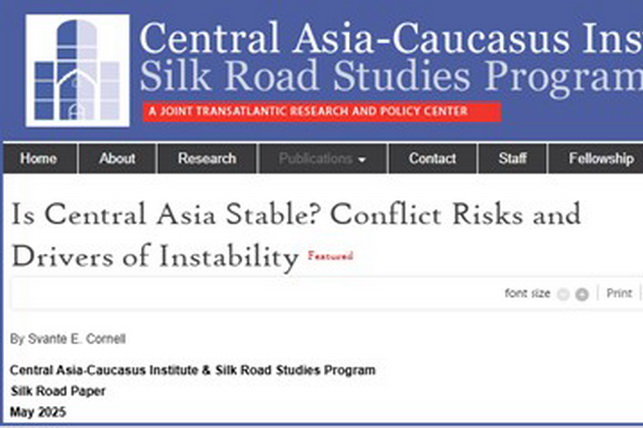
Regional Consolidation as a Sign of Central Asia’s Political Maturity
Regional Consolidation as a Sign of Central Asia’s Political Maturity
Tashkent, Uzbekistan (UzDaily.com) — The Central Asia-Caucasus Institute (CACI), a prominent Washington-based think tank, has published a report by American political scientist Svante Cornell titled "Is Central Asia Stable? Risks of Conflict and Sources of Instability."
The report places particular emphasis on the current state and future prospects of regional cooperation in Central Asia, as well as the ongoing political and socio-economic reforms across the region.
The author welcomes the efforts of Central Asian countries to strengthen regional interaction. According to Cornell, the states of Central Asia are demonstrating an increasing ability to respond to both internal and external challenges, with a renewed spirit of cooperation emerging in recent years.
“This trend of regional consolidation is a clear sign of Central Asia’s political maturity, rooted in a growing sense of confidence in national sovereignty,” the expert asserts.
Cornell argues that regional cooperation has opened a “window of opportunity” to normalize relations among Central Asian countries and to resolve complex issues, including the border conflict between Kyrgyzstan and Tajikistan. “The coordination mechanism for regional affairs launched in 2016 enabled the sides to find a compromise. The signing of the agreement demonstrated both countries’ willingness to engage in dialogue and avoid escalation. Moreover, it laid the groundwork for joint water resource management,” he writes.
A major turning point for regional cooperation, according to Cornell, was the election of Shavkat Mirziyoyev as President of Uzbekistan. This spurred the launch of the Consultative Meetings of Central Asian Leaders and significantly increased the frequency of high-level summits among the region’s heads of state.
The author underscores that Uzbekistan and Kazakhstan, as the two largest states in the region, serve as the main drivers of regional integration.
He notes that both Tashkent and Astana have established strong public institutions, pursue balanced foreign policies, and are leaders in fostering regional cooperation. This forms a solid foundation for maintaining security in Central Asia.
Cornell also highlights the reforms underway in Central Asian countries. “Uzbekistan and Kazakhstan have entered a stage of evolutionary reform while maintaining control over the political process and ensuring stability,” the political scientist notes.
He believes this reform trajectory has broadened the presence of progressive figures in government and across society. Presidents Shavkat Mirziyoyev and Kassym-Jomart Tokayev are seen as key symbols of this change. Both leaders are closely associated with reforms aimed at improving the efficiency of governance and protecting human rights.
In particular, the report emphasizes that reforms in Uzbekistan began with President Mirziyoyev’s election. “One of his significant steps was opening direct channels of communication with the population,” the author observes. Additionally, the Uzbek leader has focused on accelerating the shift to a market economy and enhancing the country’s investment appeal. These transformations have empowered the parliament and laid the foundation for building a social state.
“Reforms in the core countries of Central Asia represent a shift toward a governance model focused on meeting societal needs. These changes play a vital role in strengthening the resilience of political systems and resolving internal systemic issues,” Cornell asserts.
In conclusion, the report states that domestic transformations and a commitment to closer ties among Central Asian countries are reducing conflict risks, enabling coordinated responses to common threats, and unlocking the region’s economic potential.
The Central Asia-Caucasus Institute, founded in 1997 and led by renowned scholar Frederick Starr, is a key contributor to U.S. strategic analysis and policymaking on Central Asia and the Caucasus.